Tesla expands into batteries for homes
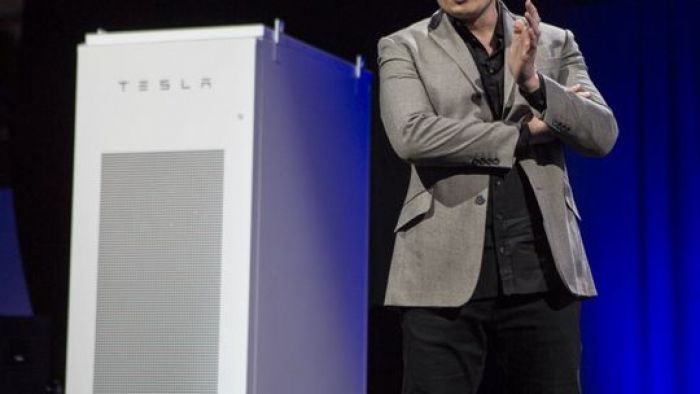
Tesla expands into batteries for homes
Tesla Motors sought to broaden its technology to cover more than electric cars Thursday by announcing a push into stationary battery units to work on conjunction with solar power for homes and businesses.
Try Another
Audio CAPTCHA
Image CAPTCHA
Help
CancelSend
Sent!
A link has been sent to your friend's email address.
Posted!
A link has been posted to your Facebook feed.

UP NEXT
03
Tesla CEO Elon Musk unveils Powerwall, a device that stores energy absorbed by solar panels, for use when the sun is down. The technology is based on the electric batteries that run Teslas. Laura Mandaro reports.
Elon Musk introduces a new home battery at a Tesla event in Hawthorne, Calif.(Photo: Chris Woodyard/USA TODAY)
HAWTHORNE, Calif -- Seeking to redefine itself as more than a high-tech automaker, Tesla Motors announced Thursday night plans to make inroads into residential and business battery systems.
While home batteries aren't as sexy as electric luxury cars, Tesla CEO Elon Musk portrayed the Powerwall Home Battery and the business system, called the Powerpack, as helping to wean the world off oil and gas.
"This is within the power of humanity to do," Musk told the large crowd gathered at Tesla's design center in this Los Angeles suburb. "We have done things like this before. It is not impossible."
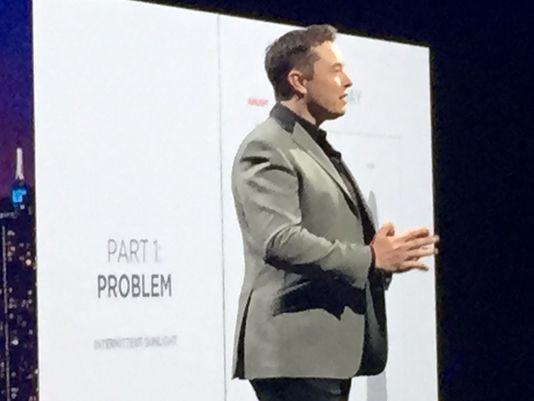
People look at newly-unveiled Tesla Powerwall batteries at the Tesla Design Studio in Hawthorne, California, April 30, 2015. (Photo: AFP PHOTO / David McNew)
Musk says the system could be a boon to those living off the electric grid, similar to moves by other other tech companies to connect some of the most remote regions of the world to services that previously required wires. Facebook is testing a solar-powered drone[1] to bring Internet to some of the most remote places on the globe. Google's Project Loon attempts to accomplish the same with balloons traveling on the edge of space.
Musk says the basic 10 kilowatt-hour Powerwall home system will sell for $3,500 and use much of the same technology found in Tesla electric cars, known for having the longest range per car of any pure electrics on the road. "In a lot of ways it's taking derivative technology from the car," he told reporters before the presentation.
It's expected that the Powerwall would be bought mostly by homeowners who want to store energy from their solar systems, allowing them to run off their own power after the sun goes down. The company showed off the sleek design of the home batteries, pointing out they are a slim six inches thick and can be mounted on walls. He says he expects to have several of them mounted in his own home.
The battery storage units will be marketed by a division called Tesla Energy. He says he expects the power systems to turn profitable next year.
Powerwall will go on sale later this year in the U.S., to be followed by foreign sales. Production will shift next to the batteries coming out of the Tesla "Gigafactory" that it is being built on the outskirts of Reno. The home batteries will be similar to the the hand-sized lithium ion batteries that run Tesla cars.
"What Tesla is doing is an all-in strategy to bring the clean-air revolution to the state. And as California goes, so goes the nation," says Roland Hwang, energy and transportation program director for the Natural Resources Defense Council.
Musk is also chairman of SolarCity (SCTY[2]), a solar energy provider, which now also offers stationary battery units. SolarCity says it has sold 300 units already this year.
Tesla hasn't been trying hard to keep its big battery plans a secret. In a job posting for a development operations engineer, Tesla says it "has developed a business unit to address the increasing need for stationary storage battery systems, which allows for even higher levels of renewable generation."
Analyst Brian Johnson of brokerage Barclays says Tesla disclosed last year that it plans to devote nearly a third of the capacity of its coming battery factory to stationary batteries. "We'll see if that happens," he says.
Another analyst, Ben Kallo of Baird Equity Research, says in a note that developing a stationary storage business can only be good news. "We believe entering storage will allow (Tesla) to more rapidly grow the company while diversifying its revenue streams," he wrote.
Tesla (TSLA[3]) was trading below $190 a share at the start of April, but it closed Thursday at $226.05 a share, down $6.40 or 2.8%. Shares had surged earlier this month [4]on word of the home battery plans.
A California winery chain says it has incorporated 21 Tesla Powerpacks into its massive solar power systems. Julien Gervreau, senior sustainability manager for Jackson Family Wines -- best known for labels like Kendall-Jackson and La Crema -- says the system, providing enough solar power for 1,300 homes is projected to cut electricity bills by about 40%. The Tesla batteries should add about 10% to the savings and the whole system should pay for itself in about five to six years.
"The guys at Tesla have really provided us with a turnkey system," Gerveau says.
Contributing: Laura Mandaro
Read or Share this story: http://usat.ly/1bjstKF
USA NOW
Calif. residents skirt drought rule by using wastewater
May 06, 2015
Find New & Used Cars
0) { %>
0) { %>
Tesla expands into batteries for homes
Tesla Motors sought to broaden its technology to cover more than electric cars Thursday by announcing a push into stationary battery units to work on conjunction with solar power for homes and businesses.
Try Another
Audio CAPTCHA
Image CAPTCHA
Help
CancelSend
Sent!
A link has been sent to your friend's email address.
Posted!
A link has been posted to your Facebook feed.
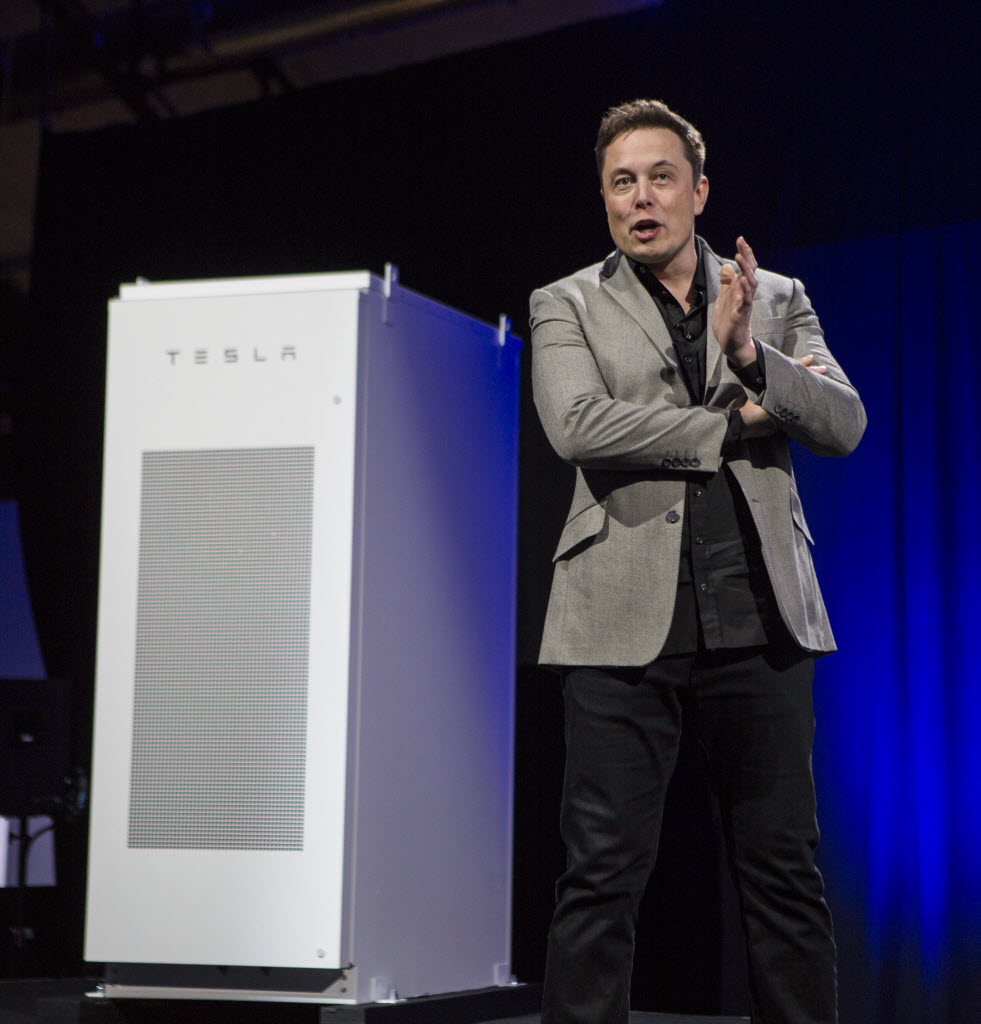
UP NEXT
03
Tesla CEO Elon Musk unveils Powerwall, a device that stores energy absorbed by solar panels, for use when the sun is down. The technology is based on the electric batteries that run Teslas. Laura Mandaro reports.
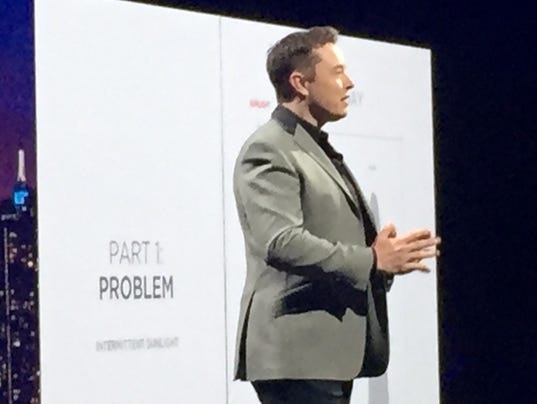
Elon Musk introduces a new home battery at a Tesla event in Hawthorne, Calif.(Photo: Chris Woodyard/USA TODAY)
HAWTHORNE, Calif -- Seeking to redefine itself as more than a high-tech automaker, Tesla Motors announced Thursday night plans to make inroads into residential and business battery systems.
While home batteries aren't as sexy as electric luxury cars, Tesla CEO Elon Musk portrayed the Powerwall Home Battery and the business system, called the Powerpack, as helping to wean the world off oil and gas.
"This is within the power of humanity to do," Musk told the large crowd gathered at Tesla's design center in this Los Angeles suburb. "We have done things like this before. It is not impossible."
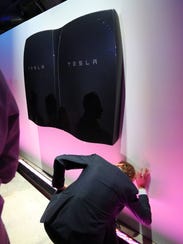
People look at newly-unveiled Tesla Powerwall batteries at the Tesla Design Studio in Hawthorne, California, April 30, 2015. (Photo: AFP PHOTO / David McNew)
Musk says the system could be a boon to those living off the electric grid, similar to moves by other other tech companies to connect some of the most remote regions of the world to services that previously required wires. Facebook is testing a solar-powered drone[5] to bring Internet to some of the most remote places on the globe. Google's Project Loon attempts to accomplish the same with balloons traveling on the edge of space.
Musk says the basic 10 kilowatt-hour Powerwall home system will sell for $3,500 and use much of the same technology found in Tesla electric cars, known for having the longest range per car of any pure electrics on the road. "In a lot of ways it's taking derivative technology from the car," he told reporters before the presentation.
It's expected that the Powerwall would be bought mostly by homeowners who want to store energy from their solar systems, allowing them to run off their own power after the sun goes down. The company showed off the sleek design of the home batteries, pointing out they are a slim six inches thick and can be mounted on walls. He says he expects to have several of them mounted in his own home.
The battery storage units will be marketed by a division called Tesla Energy. He says he expects the power systems to turn profitable next year.
Powerwall will go on sale later this year in the U.S., to be followed by foreign sales. Production will shift next to the batteries coming out of the Tesla "Gigafactory" that it is being built on the outskirts of Reno. The home batteries will be similar to the the hand-sized lithium ion batteries that run Tesla cars.
"What Tesla is doing is an all-in strategy to bring the clean-air revolution to the state. And as California goes, so goes the nation," says Roland Hwang, energy and transportation program director for the Natural Resources Defense Council.
Musk is also chairman of SolarCity (SCTY[6]), a solar energy provider, which now also offers stationary battery units. SolarCity says it has sold 300 units already this year.
Tesla hasn't been trying hard to keep its big battery plans a secret. In a job posting for a development operations engineer, Tesla says it "has developed a business unit to address the increasing need for stationary storage battery systems, which allows for even higher levels of renewable generation."
Analyst Brian Johnson of brokerage Barclays says Tesla disclosed last year that it plans to devote nearly a third of the capacity of its coming battery factory to stationary batteries. "We'll see if that happens," he says.
Another analyst, Ben Kallo of Baird Equity Research, says in a note that developing a stationary storage business can only be good news. "We believe entering storage will allow (Tesla) to more rapidly grow the company while diversifying its revenue streams," he wrote.
Tesla (TSLA[7]) was trading below $190 a share at the start of April, but it closed Thursday at $226.05 a share, down $6.40 or 2.8%. Shares had surged earlier this month [8]on word of the home battery plans.
A California winery chain says it has incorporated 21 Tesla Powerpacks into its massive solar power systems. Julien Gervreau, senior sustainability manager for Jackson Family Wines -- best known for labels like Kendall-Jackson and La Crema -- says the system, providing enough solar power for 1,300 homes is projected to cut electricity bills by about 40%. The Tesla batteries should add about 10% to the savings and the whole system should pay for itself in about five to six years.
"The guys at Tesla have really provided us with a turnkey system," Gerveau says.
Contributing: Laura Mandaro
Read or Share this story: http://usat.ly/1bjstKF
Find New & Used Cars
0) { %>
0) { %>
References
- ^ http://europe.newsweek.com/facebooks-jumbo-jet-sized-solar-powered-internet-drone-its-way-317345 (europe.newsweek.com)
- ^ http://www.usatoday.com/money/lookup/stocks/SCTY/ (rssfeeds.usatoday.com)
- ^ http://www.usatoday.com/money/lookup/stocks/FB/ (rssfeeds.usatoday.com)
- ^ http://americasmarkets.usatoday.com/2015/04/22/what-to-expect-from-teslas-q2-earnings-report/ (americasmarkets.usatoday.com)
- ^ http://europe.newsweek.com/facebooks-jumbo-jet-sized-solar-powered-internet-drone-its-way-317345 (europe.newsweek.com)
- ^ http://www.usatoday.com/money/lookup/stocks/SCTY/ (rssfeeds.usatoday.com)
- ^ http://www.usatoday.com/money/lookup/stocks/FB/ (rssfeeds.usatoday.com)
- ^ http://americasmarkets.usatoday.com/2015/04/22/what-to-expect-from-teslas-q2-earnings-report/ (americasmarkets.usatoday.com)










